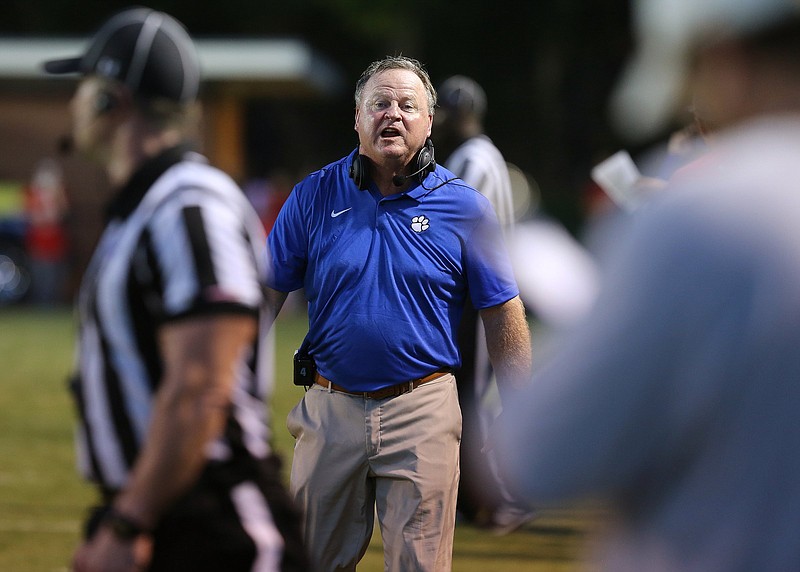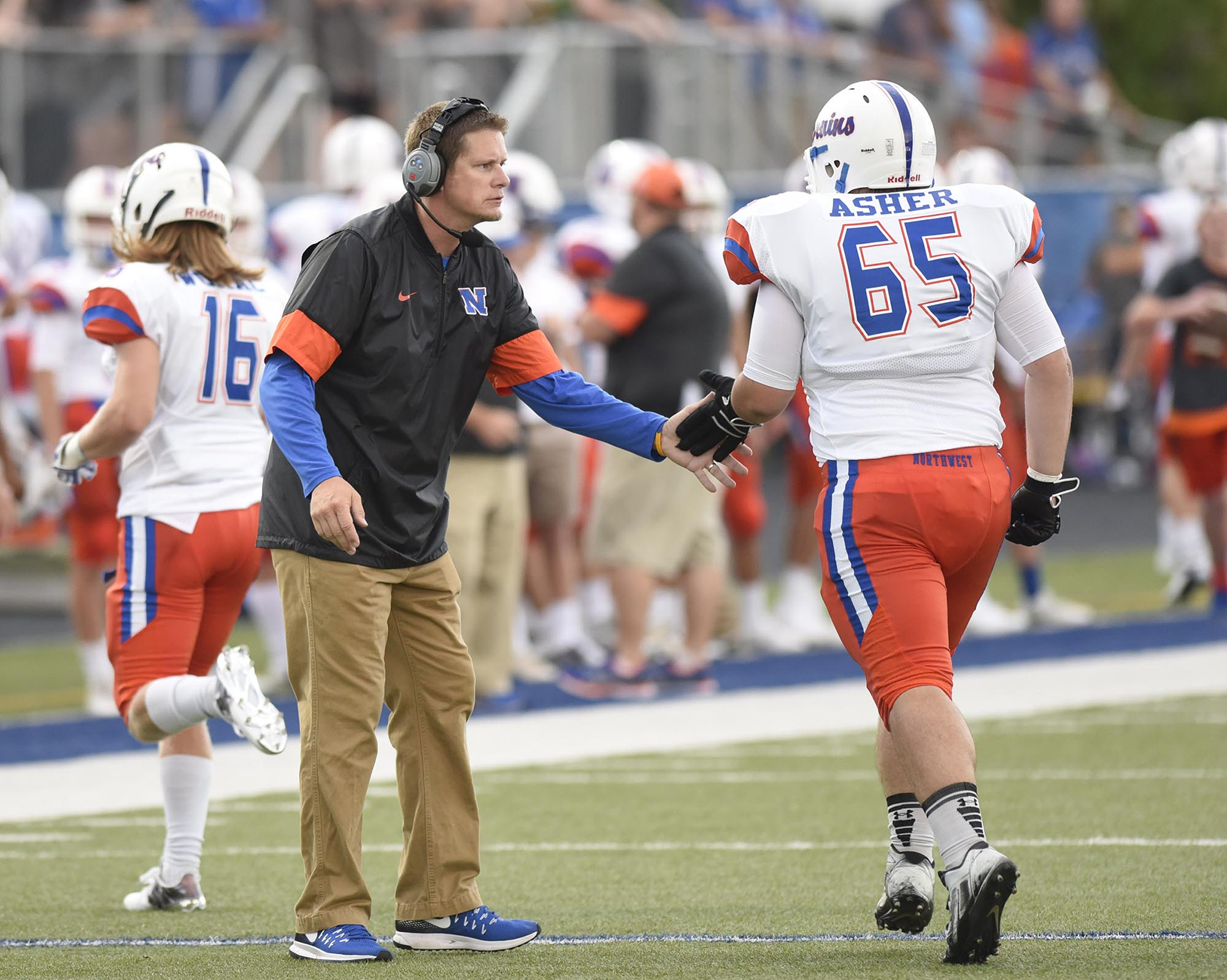As Tennessee celebrates its 25th anniversary of successfully separating athletic competition among public and private schools, Georgia's debate on the matter is heating up quickly.
The Georgia High School Association held a specially called Reclassification Committee meeting Thursday to discuss the latest proposals for the 2022-2024 classification cycle, and all of the talk centered on how to fix the growing athletic disparity between public and private schools. Nothing was decided - that won't happen until next month's scheduled meeting - but like the TSSAA a quarter-century ago, the GHSA could be headed for significant change.
At least some area coaches are in favor of an overhaul.
"It's tough in football to win against the private schools, but you've got no chance in the other sports right now," Ringgold football coach Robert Akins said. "It's a shame winning isn't about having the best players and coaches right now."
Akins was the head coach at Chattanooga private school Boyd Buchanan when Tennessee's public/private debate boiled over, initially leading to a multiplier that moved the Buccaneers up three classifications and then to the current split competition. He much prefers the latter option.
"When the TSSAA applied the multiplier, I remember we played Knox Fulton and we had no business being on the field with them," he said. "It was really a safety issue for me. We might have had 400 in the high school, and they probably had 1,500. It was dangerous, and it would still be dangerous today if Georgia private schools are moved up too high.
"Splitting the postseason is the right way to do it, and I don't think it would water it down too much by moving them out and making them play separate championships. The private schools are going to fight it, but like in Tennessee, if you can still play public schools and get good gates, then it's fair for everyone. MBA, McCallie and Ensworth, they have tremendous gates playing public schools, and if the folks down here would talk to people in Tennessee they would find out it works."
The 19 GHSA committee members in attendance Thursday, however, were not impressed with the idea, with zero support when committee chairman Curt Miller called for a straw vote. In fact, the only two proposals that had any support were one raising the current 2.0 out-of-district multiplier to 2.5 and the other allowing schools to be bumped into the state's largest class, AAAAAAA, which is currently not permitted.
The only thing completely agreed upon was that at least one more meeting will occur before the full state meeting next month.
What concerns the public school sector is the disproportionate amount of titles won by private schools.
Georgia has eight classifications, including separate public and private classes in A. There are no private schools in the two largest classes, putting nine schools in AA through AAAAA. Those nine - Benedictine, Blessed Trinity, Greater Atlanta Christian, Lovett, Marist, Pace Academy, St. Pius X, Westminster and Woodward Academy - annually finish at or near the top of most sports, with softball and wrestling the exceptions.
Northwest Whitfield's volleyball program had its best season last fall, reaching the Class AAAA finals for the first time. The Lady Bruins were swept by Marist, leaving a bad taste in the mouth of coach Kelsey Ikerd and her players.
"Their team was phenomenal," said Ikerd, a Northwest graduate. "Playing against them was an entirely different level of volleyball, and it was tough to explain to my players why it was acceptable for my hometown girls to have to play against girls from all over the state. It is almost debilitating to walk into a private school and see the cases and cases of championship trophies collecting dust."
Football, of course, is the cash cow of any high school sports association, and that's especially true in Georgia, which is why public school administrators are set on derailing the surging private school dominance in the three affected classifications. Private schools have won the past four Class AAAA championships and five of the past nine Class AA titles.
Fewer playoff games means less gate money, which affects every sport. Every round a private school advances is one less round a public school can make money. In AAAA, private schools filled nine of the 16 final four spots in the football playoffs from 2017 to 2020. Just moving schools up in classification hasn't satisfied public school supporters.
Reclassification in 2020, buoyed by the 2.o multiplier for out-of-district students that also affected public city schools such as Calhoun, moved private schools Blessed Trinity, Woodward Academy and St. Pius X up to AAAAA, where all three made the playoffs and won six combined games. Benedictine moved from AA to AAAA in 2020 and made the semifinals.
"Just bumping those schools up a class or two doesn't help anyone outside of Class AA," Northwest Whitfield coach Josh Robinson said. "There are only nine of them above Class A, but every year it seems they make up at least 50% of final four teams."
Robinson, whose team competes in AAAA, believes one simple fact should be at the forefront of the current conversation.
"The bottom line is they are able to go get kids, and the rest of us are not," he said. "They are doing nothing wrong, but it's undoubtedly an advantage. If we separate them in single-A, what is the issue separating them above that?"
Contact Lindsey Young at lyoung@timesfreepress.com. Follow him on Twitter @youngsports22.
ANOTHER LEVEL
Consider the following, keeping in mind GHSA’s Class AAAAA did not have private schools until the 2020-21 school year:— In baseball, since 2013 private schools have won five AAA titles, four AA titles and two AAAA titles.— In basketball, since 2013 private school girls’ programs have won six titles in AA to AAAA, with boys’ programs winning eight.— In cross country, only four public schools have won titles in AAA and AAAA since 2012 among the 54 girls’ and boys’ state meets. From 2000 to 2011, private schools won 74 of 96 titles in those classes.— In golf, private school girls’ programs have won seven titles in the past eight years in AA through AAAA (championships were not held in 2020 due to the COVID-19 pandemic). On the boys’ side during that same time, private schools have won 17 of 24 titles in AA, AAA and AAAA.— In girls’ soccer, from 2013 to 2018, each of the 24 championships in A (there was no split during those years in soccer) to AAAA were won by private schools, as well as the past six in AA through AAAA. In boys’ soccer, private schools won 18 of 24 titles from 2013 to 2018.— In swimming, since 2001 only two public school programs, including the Dalton girls in 2013, have won titles in classifications that included private schools.— In tennis, since 1995 private schools have won 67 of 77 girls’ titles and 69 of 77 boys’ titles in classifications that included private schools.— In track and field, private school boys’ and girls’ teams have won half of the championships in classifications that included private schools.— In volleyball, from 2012 to 2020, private schools won 21 of 27 titles in AA through AAAA and all 10 titles in AAA and AAAA since 2016.Those numbers, public school supporters will remind you, come from nine schools. There are 224 public schools in those classifications.— Compiled by Lindsey Young

